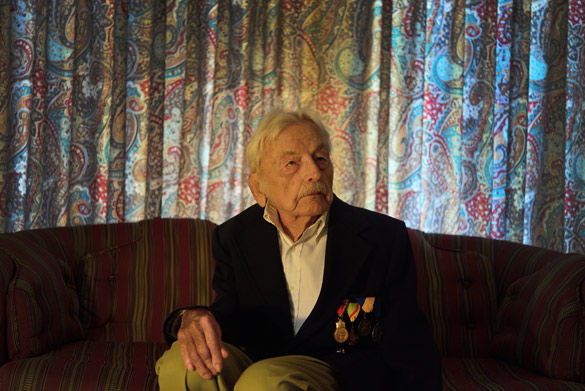Former political science professor authors 95 years of life

March 18, 2014
A veteran of the Royal Hungarian Army and former SIU political science professor has collected his life story in a self-published memoir.
Egon Kamarasy was born March 19, 1919 in the Hungarian army hospital in Szeged. His father was an adjutant in the 62nd Austrian-Hungarian Infantry Regiment and his grandfather was involved in the military as well.
“My father was an officer, my grandfather was an officer, as well as some uncles, all in the Austrian- Hungarian Army. However, that’s not what influenced me,” he said. “I served my regular time as a diplomat, but unfortunately, the war came too soon.”
Advertisement
In a time period where his homeland was involved in World War II, Kamarasy decided to come to America because he knew a host of family members would help him along.
“Hungary was occupied by communists in those days, and I didn’t like communists,” he said. “I had family members who already immigrated here, and I never regretted the move.”
Kamarasy arrived in Carbondale in August of 1959, and settled in Poplar Park with his first wife in an area spacious enough for his horses he loved to ride and breed.
As a former manager of the Olympics, Kamarasy specialized in being an area manager for events catered to individuals between the ages of 6 and 20.
“My love of horses came from childhood,” he said. “I chose this place to live because of the amount of space the land has where I can breed and ride horses. Over the years, I have organized many competitions for horse riding.”
Having been a resident of Carbondale for nearly 55 years, Kamarasy said he always paid attention to the changes of Carbondale, particularly in the university.
“Carbondale has not changed terribly much,” he said. “It is a university town and when I got here, there were roughly 3,600 students and life was sort of concentrated around the railroad station. Everything in Carbondale has been developed over time, including the university.”
Advertisement*
Kamarasy said when he first arrived here, the campus atmosphere was much more intimate than it is now.
“Everybody knew everybody, and I even knew all my students by first and last name. That cannot be said today,” he said.
Despite being from a communist-controlled foreign country, Kamarasy said he did not experience any discrimination from his colleagues or students.
“I was never a member of the Communist Party and was never accused of such,” he said. “I began my teaching career here as a replacement professor for a previous professor who had suddenly died, and then developed my own political science course that I taught for the next 30 years.”
The course he created was called political economics, and he said that the students in his class were enthused to debate and learn, as was he.
Kamarasy also taught political science classes in the Centralia jail, an experience he said was very eye opening.
“Most of the inmates had strong political convictions which, unfortunately, many freshman students at SIU didn’t have,” he said.
Eight years ago, Kamarasy decided to put his life experiences into a book.
“I was inspired by the journals I had been keeping over the years since I was twelve” he said.
Kamarasy has over fifty journals written in French, Hungarian, German and English.
“All my life I kept notes,” he said. “I believe that we can avoid mistakes in the present if we study the history of the past, and my notes served as a reminder of that.”
Linda Langston, his personal assistant for the past eight years, says she has grown tremendously from helping write his life story.
In 2006, Kamarasy put an advertisement in a few newspapers looking for someone who would assist him in typing his memoir. Langston responded and has been with him ever since.
“My background is in law, but I needed another job,” she said. “When I saw his ad searching for someone who was skilled in typing, I answered. I figured I would only work for him for a couple of months, but I realized that more chapters needed to be added to his life and mine, too.”
Langston said being employed by the professor gave her many pillars of wisdom she applies to her personal life daily.
“I think the greatest lesson I have learned from Kamarasy over the years is that great frustration is all a part of the imperfect world,” she said. “I used to think that where there is great frustration then I have to leave, but the professor taught me patience.”
Langston is not the only one who had good things to say about Kamarasy. Janice Fiorino, a map librarian assistant in Morris Library assisted the professor in finding maps of his childhood villages.
“He was looking for small towns in the area he was from,” she said. “It was not an easy task, but I enjoyed completing the task.”
Finding all the maps included in the book took about two years, Fiorino said.
“It’s a really great feeling of achievement to meet this gentlemen in his 90s, to look at his pictures and see that he was a man of importance,” he said. “This project introduced me to an area and era of a country that was new to me and I am very grateful for this opportunity.”
The book is now in print, however it is not sold in stores. To acquire a copy of the book, send an email to [email protected] or call 457-6167. The cost of the book is $60.
Kia Smith can be reached at [email protected] on Twitter @KiaSmith__ or at 536-3311 ext. 268
Advertisement







